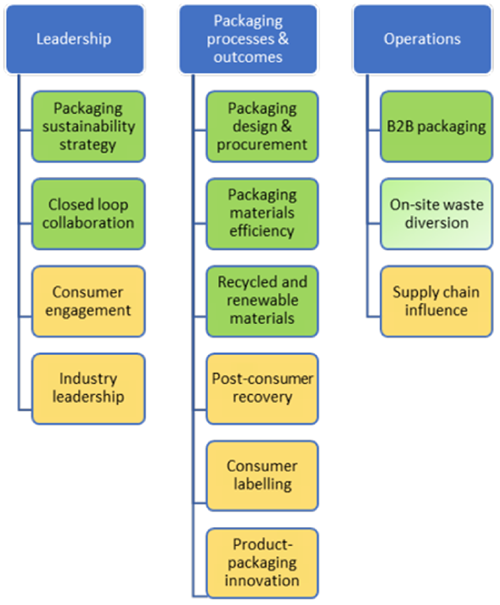
A framework and self-assessment tool to help Australian companies report on their progress towards meeting packaging sustainability targets have been developed and tested by ISF researchers, in partnership with Dr Helen Lewis, a specialist in product stewardship and packaging sustainability. Implementation of the tool and framework is intended to substantially improve packaging sustainability outcomes across Australia.
The tool was developed based on ISF’s research into how industry leaders balance the need to use enough packaging to protect their products from damage or wastage versus the environmental impacts of their packaging.
The work was done for the Australian Packaging Covenant Organisation (APCO), the entity in charge of managing and administering the Australian Packaging Covenant, which is an agreement between Australian governments and industry representing over 900 Australian organisations, and will be rolled out to all APCO members in 2017. APCO also administers the Sustainable Packaging Guidelines (SPG) which are designed to promote the reduction of waste from consumer packaging materials and change the culture of business to design more sustainable packaging for the entire packaging life-cycle.
The framework underlying the tool consists of thirteen independent criteria in three categories: (1) Leadership; (2) Packaging Processes and Outcomes; and, (3) Operations. Each criterion has five levels of performance ranging from ‘Getting started’ to ‘Beyond best practice.’ Companies are able to progress to higher performance levels when they can demonstrate that they have met the requirements for those levels.

The self-assessment tool asks organisations specific questions relating to the packaging sustainability criteria. The tool uses responses to these questions to automatically calculate the packaging sustainability performance of the company within the framework and provide recommendations for how the company can progress within the framework to improve their packaging sustainability. It replaces previous APCO reporting systems and should lead to better packaging outcomes, and clearer, more consistent and streamlined reporting.
The overwhelming response from feedback provided by the companies who tested the tool was that the framework is a comprehensive and fair mechanism to assess an organisation’s progress towards packaging sustainability and the framework and online self assessment tool will assist companies to improve their packaging sustainability.
One participant in the pilot said about the tool,“[it] helps companies think through their overall approach as well as detailed activities that support packaging sustainability”.
The framework can be used by a diverse range of companies, irrespective of the products they sell, relative position in the supply chain, company size or sector they belong to. It provides sector specific descriptions on how to answer each criteria and the ability to skip criteria that are not relevant to the company. It rewards companies for setting specific targets, monitoring those targets and then publicly reporting against those targets.
The framework recognizes companies who are going beyond incremental improvements in packaging efficiency by implementing innovative whole life product-packaging solutions and trialling new business models that disrupt existing practice.
It rewards companies who are providing industry leadership and working closely with suppliers and customers both up and down their supply chain to improve packaging sustainability.
Companies are encouraged to review and improve all packaging under their control or that they have influence over (i.e. both existing and new packaging) rather than only considering the design of new packaging that is being put onto the market.
ISF is now working on the next step, to make the tool into a secure online database where APCO members will be able to enter and monitor their performance over time. They will also be able to undertake benchmarking analysis, create custom reports and submit company action plans for how they are going to improve packaging sustainability in the future.
Project Director, Dr Scott Kelly said: “We envisage the online assessment tool will primarily be used by companies to help them identify opportunities to improve their packaging sustainability performance. The scoring system will give them a robust assessment of their strengths and weaknesses in relation to the framework. And the recommendations provided by the tool will explain how the company can progress to the next level within each criterion in the framework.”
Kelly, S., Lewis, H., Atherton, A. & Downes, J. (2017): Packaging Sustainability Framework for APC Signatories: Final Report. Institute for Sustainable Futures, UTS.
Kelly, S., Lewis, H., Atherton, A., Downes, J., & Wyndham, J., Giurco, D. (2016): Packaging Sustainability in Consumer Companies in Emerging Markets: Final Report. Institute for Sustainable Futures, UTS.

